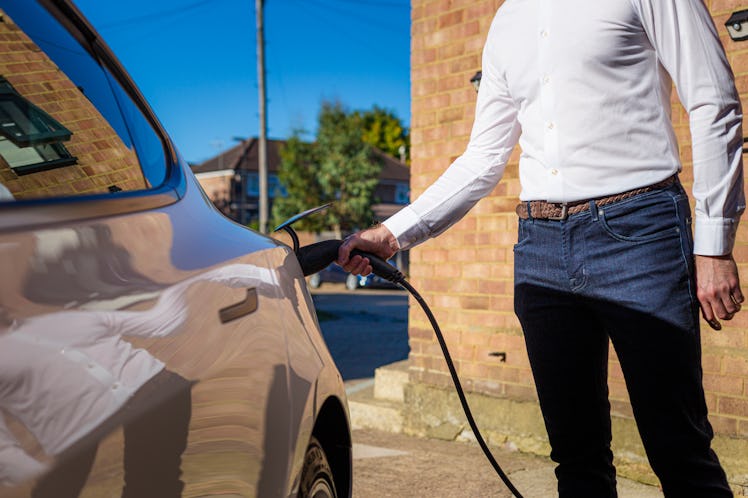These 21 EV Models Will Qualify For $7,500 Tax Credit Through This Year
The Inflation Reduction Act is now law — these are the 21 electric vehicles that currently qualify for the $7,500 tax credit until the end of 2022.

On August 16, 2022, President Biden signed the Inflation Reduction Act into law. The law is a sweeping spending bill and the largest-ever piece of legislation crafted to fight climate change. It also includes major reforms to Medicare and the IRS and raises taxes on the wealthy and corporations. The bill could help reduce greenhouse gas emissions by 40% by 2030.
The legislation will do a great deal for American consumers. It includes major tax credits for green-powered home improvement projects such as installing heat pumps, solar panels, and induction ranges. It also expands upon, and changes, already-existing electric vehicle (EV) federal tax credits that made EVs cheaper for people by giving them money back at tax time for the purchase. That tax credit system will be reformed — for better, but with a catch.
That catch? The legislation makes it a little bit harder for EV makers to manufacture vehicoles that qualify for the $7,500 tax credit. Before August 16, 2022, there was no requirement that EVs be American-made to qualify. But for EVs to qualify under the new Inflation Reduction Act tax credit, their final assembly must be in North America.
Under the previous tax credit, which didn’t have this requirement, 72 models were eligible. But now, with the new rules in place, only 21 currently are — until the end of 2022, when additional provisions will go into effect on Jan. 1, 2023.
The additional provisions that go into effect next year will require that at least 40% of the battery must be made in North America, and will have new restrictions on where minerals and batteries can be sourced. There will also be income caps for who can qualify for the tax credit. One good change is that the new credits will also lift a 200,000-vehicle cap on how many cars a manufacturer could sell before the tax credit expired. With the new rule, starting in 2023, the tax credit will be extended to be active until 2032, with no cap on how many EVs from a manufacturer can be sold with the tax credit.
The Biden administration released a list of 21 EVs that qualify for the $7,500 EV tax credit until the end of 2022 (because their final assembly is in North America), before the additional rules changes set in on January 1, 2023 — including the lifting of the 200,000 vehicle manufacturer sales cap.
That means Tesla and General Motors (a brand that includes Chevrolet and Cadillac), which passed the 200,000-vehicle per manufacturer cap enforced under current legislation, are ineligible for the full tax credit for the rest of the year but will be eligible for it next year.
The 21 EV models that will qualify for a tax credit of $7,500 are, per Electrek:
2022 Models:
- 2022 Audi Q5 (PHEV model)
- 2022 BMW 3-series Plug-In (330e)
- 2022 BMW X5 (xDrive45e)
- 2022 Chrysler Pacifica PHEV
- 2022 Ford Escape PHEV
- 2022 Ford F Series (F-150 Lightning)
- 2022 Ford Mustang MACH E
- 2022 Ford Transit Van (E-Transit)
- 2022 Jeep Grand Cherokee PHEV
- 2022 Jeep Wrangler PHEV (4xe)
- 2022 Lincoln Aviator PHEV (Plug-In Hybrid)
- 2022 Lincoln Corsair Plug-in
- 2022 Lucid Air
- 2022 Nissan Leaf
- 2022 Rivian EDV (Fleet only)
- 2022 Rivian R1S
- 2022 Rivian R1T
- 2022 Volvo S60 (T8 Recharge PHEV)
*These models are ineligble for the tax credit until the end of 2022 because more than 200,000 models have been sold.
- 2022 Chevrolet Bolt EUV (*Manufacturer sales cap met)
- 2022 Chevrolet Bolt EV (*Manufacturer sales cap met)
- 2022 GMC Hummer Pickup (*Manufacturer sales cap met)
- 2022 GMC Hummer SUV (*Manufacturer sales cap met)
- 2022 Tesla Model 3 (*Manufacturer sales cap met)
- 2022 Tesla Model S (*Manufacturer sales cap met)
- 2022 Tesla Model X (*Manufacturer sales cap met)
- 2022 Tesla Model Y (*Manufacturer sales cap met)
2023 Models:
- 2023 BMW 3-series Plug-In (330e)
- 2023 Mercedes EQS
- 2023 Nissan Leaf
*These models are ineligble for the tax credit until the end of 2022 because more than 200,000 models have been sold.
- 2023 Bolt EV (*Manufacturer sales cap met)
- 2023 Cadillac Lyriq (*Manufacturer sales cap met)
For models built both overseas and in North America — Chrysler and Audi, for example — the Treasury Department says to assess your vehicle identification number to analyze if your vehicle is eligible for the tax credit or not.
EVs from manufacturing companies such as Toyota, Hyundai, Porsche, and Kia that are producing their models overseas are automatically ineligible for the tax credit.
However, the IRS states that a consumer can still qualify for the tax credit if they already had a binding written contract for their car that now doesn’t qualify before the new requirements for the new EV tax credit law went into effect or the additional ones go into effect on January 1st, 2023.
And, what’s more, per TechCrunch, is that by 2024, peopel buying EVs wil be able to transfer their credits to their dealership while buying the car meaning they won’t have to wait until they file their taxes to get the benefits of going green.